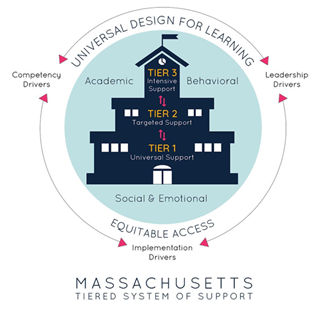Social and Emotional Learning Guidelines for Massachusetts Schools
/Did you know that he Massachusetts Department of Elementary and Secondary Education (or more commonly called DESE) has Guidelines on implementing Social and Emotional Learning in schools in the Commonwealth? Now be cautioned that DESE only has guidelines and they are not frameworks/curriculum which makes them best practices but not mandatory in anyway to implement.
DESE’s goal is to “Promote systems and strategies that foster safe, positive, healthy, culturally-responsive, and inclusive learning environments that address students’ varied needs and improve educational outcomes for all.” This goal is represented in the graphic above, taken directly from DESE’s website.
DESE has developed, using CASEL as a foundation, five core competencies to Social Emotional Learning. They are as follows:
Self-awareness: The ability to accurately recognize one's emotions and thoughts and their influence on behavior. This includes accurately assessing one's strengths and limitations and possessing a well-grounded sense of confidence and optimism.
Self-management: The ability to regulate one's emotions, thoughts, and behaviors effectively in different situations. This includes managing stress, controlling impulses, motivating oneself, and setting and working toward achieving personal and academic goals.
Social awareness: The ability to take the perspective of and empathize with others from diverse backgrounds and cultures, to understand social and ethical norms for behavior, and to recognize family, school, and community resources and supports.
Relationship skills: The ability to establish and maintain healthy and rewarding relationships with diverse individuals and groups. This includes communicating clearly, listening actively, cooperating, resisting inappropriate social pressure, negotiating conflict constructively, and seeking and offering help when needed.
Responsible decision making: The ability to make constructive and respectful choices about personal behavior and social interactions based on consideration of ethical standards, safety concerns, social norms, the realistic evaluation of consequences of various actions, and the well-being of self and others.
But how does this help you and your student who struggles with
social and emotional difficulties?
You could print out the guidelines and use them to help you ask for services and/or supports to help your student.
You could use the guidelines as a guide to writing effective IEP goals and benchmarks.
You can educate your student’s teacher/aides/etc on some other ways they could support your student in accordance with DESE approved strategies.
You could review the guidelines and see if there are strategies you can incorporate into your child’s daily/home schedule.
You can refer to the guidelines to help you if there is a dispute with the school/district about what they can and cannot do (again remember the guidelines are just that and are not mandatory items a district must implement.)
Have questions or concerns about your student? Contact us to discuss further:
E.M. Curran & Associates LLC
10 Tower Office Park
Suite 406
Woburn, MA 01801
Phone: 781-933-1542
Fax: 781-933-1549
ellen@emcurranlegal.com












